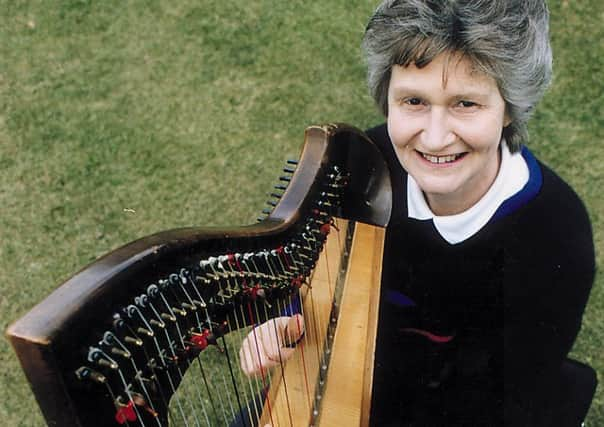Music: Plucked from history '“ the spectacular revival of the clarsach


When, during the 1931 Mòd in Dingwall, a handful of harp-toting ladies gathered for the inaugural meeting of the Clarsach Society, they could hardly have anticipated the future strength of revival their instrument would enjoy, or the diversity of styles and stages the renaissance of the Scottish harp would embrace.
To mark last year’s 85th anniversary, the Society commissioned a history of both the organisation and the revival. The result, launched at last month’s Edinburgh International Harp Festival, is In Good Hands, meticulously researched and written by Dr Stuart Eydmann, a musician and ethnomusicologist who, while not himself a harpist, has found himself “around the instrument for most of my musical life”, not least as a member of the renowned Whistlebinkies folk band.
Advertisement
Hide AdAdvertisement
Hide AdEvoking the widely differing situations in which the Scottish harp finds itself in the 21st century, from early music performance in a cathedral to a Manhattan jazz cellar, a kirk wedding to a festival commission, Eydmann encapsulates how the revived Scottish harp has become an integral part of our cultural life: “To such settings it brings messages of Scotland’s historic past and of national identity and, of course, it sounds and looks gorgeous.”
He traces the instrument’s history over more than a millennium. By the end of the 19th century it had become associated with the Celtic Revival and the burgeoning interest in Gaelic language and culture. Interest continued during the early 20th century, with modernised instruments and playing techniques, while “the clarsach was once more regarded as the authentic and appropriate accompaniment to Gaelic song”. Hence that inaugural meeting at the 1931 Mòd.
The book records numerous figures who have played important roles along the way, from Victorian and early 20th-century pioneers such as Jessie MacLachlan and the globetrotting Eloise Russell Fergusson, to recent influential figures such as Isobel Mieras, the Clarsach Society’s current president, and innovative, new-generation players like Catriona McKay, Savourna Stevenson and many others. The clarsach revival, Eydmann concludes, “has been one of the nation’s most significant musical achievements of the past century”.
It has also been a revival powered largely by women, although notable exceptions such as William Jackson, Simon Chadwick and Bill Taylor spring to mind. And the important contribution of another woman, this time a singer-songwriter, is celebrated in another new book, encapsulating a different if fundamental strand of the folk scene – that of irreverent debunking and political agitation.
They Sent a Wumman: The Collected Songs of Nancy Nicolson celebrates this singer-songwriter, teacher, folk activist and champion of the Scots tongue, described variously as an “instant ceilidh” and a “cultural crofter”, whose soft Caithness lilt belies an often slyly irreverent muse. Published by Grace Note, They Sent a Wumman – the title song a mischievous broadside at sexism – contains 50 of her songs, a veritable compendium of necessary subversion, for Nicolson’s songs champion the underdog, deflate the pompous and tilt unsparingly at misuses of power – as in Maggie’s Pit Ponies, about the Miners’ Strike, the mercilessly excoriating Tony B-Liar or her droll commentary on the cavalier handling of radioactive goods, E Man at Mudded Id. And for honest humanity, try The Mistress, an eloquent lament for those lost at sea.
The book includes commentaries from its editor, Eberhard Bort, fellow folk activist Ewan McVicar, actor and writer Gerda Stevenson and Caithness poet George Gunn, as well as a warmly anecdotal, autobiographical introduction from Nancy herself. She may be a long-time Edinburgh resident, but as she puts it: “There is always Caithness voices in my head.”
Sadly, a copy of They Sent a Wumman was the last communication I received from the inimitable Eberhard “Paddy” Bort, before his untimely passing in February. Edinburgh Folk Club will host a suitably life-affirming memorial concert for him at the Queen’s Hall on 8 June, featuring Cathal McConnell, Rab Noakes, Karine Polwart and many others.
In Good Hands is available from the Clarsach Society. See www.clarsachsociety.co.uk or e-mail [email protected]
See also www.gracenotepublications.co.uk